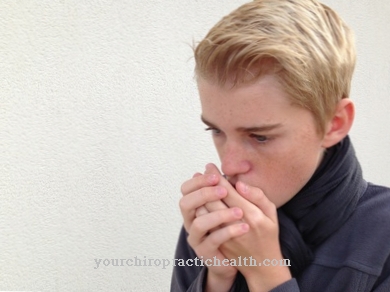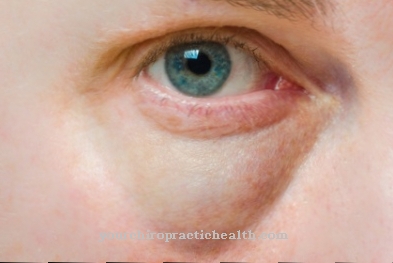Those who are tired more often during the day usually do not see this as an illness, because physical and mental exertion cost strength and can make you tired. Here can Daytime sleepiness strongly interfere with a normal daily routine and should be treated by a doctor.
What is daytime sleepiness?

Daytime sleepiness is an abnormal need for sleep and physical exhaustion during the day despite quantitatively adequate sleep. During the day, those affected often feel weak, unable to concentrate, physically drained and find it difficult to motivate themselves for daily concerns.
Some barely manage to fight against the excessive need for sleep, they even close their eyes for a short time while working. It's really bad in darker rooms and when you don't have to be active. Daytime sleepiness becomes particularly dangerous when it leads to microsleep in traffic, which can have fatal consequences not only for the driver himself, but also for others involved in traffic.
There are different forms of daytime sleepiness: Some people are chronically exhausted, but can still meet their daytime obligations. Others feel so weak and drained that they can hardly manage anything, as in the case of chronic fatigue syndrome or the rare disease narcolepsy.
causes
Daytime sleepiness can have various causes. Today we are exposed to a variety of physical and especially mental and emotional stresses that exhaust body and mind. Another cause can be an unrefreshing night's sleep. One cause of this could be snoring, especially sleep apnea syndrome with paused breathing while sleeping. Even those who cannot switch off internally do not sleep restfully.
Respiratory infections can make breathing difficult while sleeping. Depression, iron deficiency and an underactive thyroid can also lead to daytime sleepiness.
With restless legs syndrome, those affected feel abnormal sensations and the urge to move in the legs and cannot calm down internally, get up repeatedly and at some point fall asleep completely exhausted and feel exhausted in the morning. A special, rare form of daytime sleepiness is narcolepsy, in which those affected are forced to sleep and more often step away from activities.
You can find your medication here
➔ Medicines against tiredness and weaknessDiseases with this symptom
- Narcolepsy
- Restless legs syndrome
- Burnout syndrome
- Anxiety disorder
- Sleep apnea
- Hypothyroidism
- Obesity
- cancer
- Respiratory infection
- Iron deficiency
- Mineral deficiency
- anemia
Diagnosis & course
When a doctor is consulted because of the increasing level of suffering, he first gets an idea of the extent of tiredness. He wants to know whether the patient is just feeling tired or whether he actually falls asleep doing various activities during the day. Do you see the first signs of extreme tiredness in the morning or do they only appear during the day? How long do these periods of fatigue last?
The family and professional situation of the patient and the duration and quality of sleep are also important for the assessment. Are there weight fluctuations up or down? Does the patient snore? Can environmental influences play a role in fatigue?
The anamnesis is followed by a physical examination, particularly of the liver, spleen, and lymph nodes. In addition, the heart, lungs, airways and mucous membranes are also examined to find out the cause of the tiredness. If night snoring is a possible cause, the doctor will refer the patient to a sleep laboratory, where it will be examined whether sleep apnea syndrome is a possible cause.
Complications
Daytime sleepiness is most often caused by a lack of sleep. An acute lack of sleep leads to irritability and headaches in those affected. In addition, the person concerned cannot concentrate properly and his performance can decrease as a result. Above all, this severely restricts the performance of the profession.
Social life can also have consequences, as the person concerned tends to keep his distance from his fellow human beings and thereby isolate himself socially. This can lead to depression and anxiety, especially if the lack of sleep is chronic, which also exacerbates the lack of sleep. Depression usually leads to alcohol and drug abuse. In the worst cases, the depressed person may have suicidal thoughts.
A chronic lack of sleep also increases the risk of cardiovascular diseases. This makes a heart attack or stroke more likely. In addition, the person concerned usually has high blood pressure. Anemia, in addition to daytime sleepiness, also leads to a marked decrease in performance and weakness, which, if left untreated, can also result in depression.
Cancer also often leads to a lack of sleep, as it mainly affects the psyche. Depending on the type of cancer, there is, for example, severe weight loss and weakness and decreased performance. In addition, some types of cancer cannot be treated and are usually fatal within a year. Cancer can also spread by metastasizing and affecting other organs of the body.
When should you go to the doctor?
Daytime sleepiness can be normal in jobs with shift work, but still uncomfortable. The natural sleep rhythm of humans is turned upside down and may not adapt to the necessary rhythm so quickly, so that daytime sleepiness occurs. If this only happens occasionally, a doctor's visit is not required.On the other hand, if daytime sleepiness becomes a burden in everyday life and at work for a shift worker, a doctor should be consulted. He can work out proposed solutions together with the patient that enable a sleep rhythm that is more appropriate to his needs and causes fewer problems.
There are also medicinal remedies, but due to their strong effectiveness, they should only be taken under medical supervision. If daytime sleepiness occurs in a person with a normal day-night rhythm, the doctor should be consulted if it occurs regularly or if it becomes increasingly worse. If it is clearly due to a night of drinking and does not become permanent, the doctor does not need to examine it of course.
However, if such a cause cannot be identified, it may be that physical or emotional factors have a negative impact on the sleep rhythm. The triggers can be illnesses that don't get better on their own without treatment. A doctor's appointment when the first symptoms appear can enable prompt treatment and speedy improvement - not just in terms of daytime sleepiness.
Doctors & therapists in your area
Treatment & Therapy
If no physical cause has been found, the patient can try to remedy his daytime sleepiness by observing health-promoting sleep hygiene with a day-night rhythm that is as regular as possible. Since excessive stress leads to exhaustion, those affected should also reduce professional and private stress to a healthy level.
Alternating showers, which stimulate the circulation, help to get fit in the morning. Regular ventilation during the day ensures sufficient oxygen and can drive away tiredness. Lush, fatty meals, alcohol and sedatives can make you sleepy, so caution should be exercised here. Sufficient drinking during the day stimulates the circulation.
If the cause is sleep disorders, the doctor can, if necessary, prescribe a sleeping pill that ensures more restful sleep. There are several treatment options for sleep apnea. In lighter cases with only a few pauses in breathing, a change of sleeping position is recommended, because sleeping on your back promotes snoring. A protrusion splint prevents the lower jaw from falling back during sleep. In more severe cases with numerous pauses in breathing, treatment is carried out with a special breathing mask.
If there is an organic disease that leads to chronic fatigue, this is given priority. Chronic fatigue syndrome is mainly treated with behavioral measures and exercise and, if necessary, additional pain therapy.
In the case of burnout or depression, patients are advised to seek psychotherapeutic help in order to find out the causes and to cure them with the help of suitable psychotherapeutic methods.
Outlook & forecast
The medical outlook for daytime sleepiness depends heavily on its cause and therefore cannot be universally predicted. If daytime sleepiness is not treated, there is usually a strong limitation of everyday life. So the patient can no longer do certain things because he has no strength and simply feels exhausted.
Daytime sleepiness therefore also has a negative effect on everyday work and social contacts. It is not uncommon for social problems and exclusion to occur here if the person concerned no longer takes part in social events due to being tired during the day.
Specific medical treatment against daytime sleepiness is not possible. However, it is necessary to identify the sources that cause the tiredness. Above all, this includes abstaining from alcohol and changing your diet. It is not uncommon for fatigue to occur as a result of burnout, which can be treated by avoiding stress.
In order to avoid daytime sleepiness, the person concerned should pay attention to a healthy diet and a balanced lifestyle. As a rule, daytime sleepiness can be avoided or combated, so that there are no further complaints or complications.
You can find your medication here
➔ Medicines against tiredness and weaknessprevention
The most important prevention of chronic daytime sleepiness is generally a balanced lifestyle with sufficient recovery phases. A healthy, vitamin-rich diet strengthens the body and ensures better resilience. To reduce stress, exercise in the fresh air, maybe even a sport that is fun, is a useful way to balance.
People who tend to constantly overload themselves at work should work on an appropriate work-life balance. Anyone who works in the office can ensure sufficient oxygen through regular ventilation and, in phases when tiredness takes over, they can get up from their desk and do other work in between.
You can do that yourself
Symptoms of tiredness during the day can have different causes. The measures that can be taken against it can therefore be so different. It is important to supply the body with sufficient oxygen. It is advisable to open the window regularly and ventilate well.
In order to get the circulation going again, it is still advisable to briefly leave the office chair, get up and do a few stretching exercises. This only takes a few minutes and works wonders in terms of performance.
Diet is an important factor. The fresher and more varied the food, the more valuable vitamins and minerals it contains and the more strength the body can get from food. Heavily processed foods can taste delicious, but only donate energy for a short time and make you sluggish. Matcha tea is a natural and healthy stimulant.
Sufficient sleep is just as important to keep tiredness within limits during the day. Sleep is particularly restful in a well-ventilated, colder room. It is important not to drink or smoke alcohol before going to bed. Nicotine and alcohol disrupt the natural sleep rhythm and cause fatigue the next day. A power nap in between can also help against daytime sleepiness. It is important not to sleep longer than fifteen minutes.













.jpg)

.jpg)
.jpg)











.jpg)